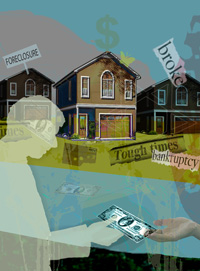Being Jewish
Commentary
Commentary: Breaking a Recession’s Social Barriers

I am ashamed to talk about our new house. It’s a beautiful house, one we could not have afforded before the market crashed. But how can I discuss it with my friend, who is out of work and out of cash and has asked her sister to pay her rent? How will I mention it to a family of five I know who lost their home because the husband no longer has a job? I am embarrassed by my family’s financial success when financial stresses are crushing people I love.
That shame is a common feeling these days. Some psychologists are using the term Survivor’s Guilt to describe the feeling after a layoff, when you return to your desk and are conscious of the absent person who yesterday sat next to you. Managers and executives who oversee layoffs may also feel guilt and shame, though most try to hide it, not realizing their false projections of confidence intensify the pain around them.
People who lose their jobs can feel like outcasts, thrown out by their employers and avoided by their friends. That’s because it is awkward to be with someone undergoing a loss, especially when you are already burdened with shame. Some react to job loss with a depression so thick they may be unable to reach out and accept help if it is offered.
Others react with anger. Some sabotage themselves, lashing out at former employers who could have served as good references. Worse, some lash out at their families, yelling because the laundry wasn’t put away or dinner was overcooked, never admitting the real issue is financial anxiety. In several cities, domestic violence shelters are being forced to turn women away due to skyrocketing needs and plummeting donations. The women, overwhelmed with fear, retreat deeper into silence.
Shame, guilt, depression, anger, fear, silence: These are the feelings of a recession. At the time when we need each other the most, we erect barriers. We feel ashamed if we are out of work, ashamed if we still have good work. We pretend we don’t see the pain around us, that we aren’t in pain ourselves. We become a community of strangers.
“From the depths I call to you O, God” (Psalm 130:1). The Hasidic masters taught that the moment we reach the lowest depths, we have the greatest potential. They saw in every endeavor a pattern of rising and falling and rising again, though their primary interest was in matters of the soul, not the economy. In a relationship with God, one must fall to low places, for the only way to achieve true greatness is to enter the realm of doubt. Doubt leads to questioning and searching, and through the search comes a new level of holiness. Says Reb Nosson, the student of Reb Nahman of Bratslav, “A person is forbidden to stand still. At the moment that he experiences the fall that is before the rise, then he is far from God and His glory is hidden from him. Then he must search and ask ‘Ayeh, where is the place of His glory?’… For it is impossible to rise up from level to level except through ‘Ayeh, where?’” (Likutei Halakhot, Hoshen Mishpat 3).
In a social crisis, we must search for the Godliness in each other and in ourselves. Says Reb Nahman, “A person must also find the good in himself…. [I]t is forbidden to fall to misery.” Gather up these little bits of goodness and something beautiful will emerge, uplifting us all.
In practical terms, Reb Nahman might tell us to acknowledge our resources. If you are prospering during this time, do not be embarrassed—be generous. If you are hurting, search for the potential in what you have. Recall Maimonides’s demand: “Even a poor person who feeds himself from charity is required to give charity to another.” Elsewhere Maimonides writes: “If a poor person asks from you and you have nothing in your hands, soothe him with words.” Every one of us can offer something: extra money to charity, a phone call to an acquaintance who has lost a job, a job lead to one who is looking. By giving, we raise ourselves up. We recognize that we have something worth giving, and we recognize the worthiness of another to receive.
Even more important, analyze the relationships in your life. Are you estranging yourself from friends and community? Are you erecting silent barriers of guilt or depression? Lower those barriers by searching for the best in yourself. You are worthy of connecting to another. Are you hurting those who could help you or those who love you through misplaced frustration? Take the time to uncover the hidden roots of your anger. Understanding it will help you search for the good in the people who now make you angry, to see them as worthy of your connection.
Changing ourselves is one of the hardest things to do, but it can be done: That is a cornerstone of Jewish belief. We start by identifying the feeling that needs to be changed, then every day setting aside time to think about it, to tell ourselves that we will change. And always we must be searching, always searching, for the best in ourselves and in others. H
Ilana Goldhaber-Gordon, a biochemist, is a rabbinical student at the Academy for Jewish Religion in Los Angele










 Facebook
Facebook Instagram
Instagram Twitter
Twitter
Leave a Reply